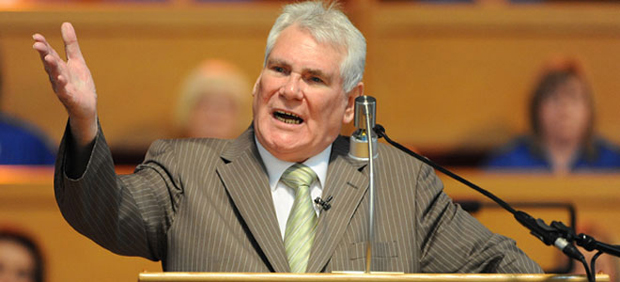What’s the difference between “offensive” and “grossly offensive”? Is it, as is said of the erotica versus pornography, the difference between using a feather and using a whole chicken?
Last week in Belfast, it was left to District Judge Liam McNally to decide whether a solitary quill or an entire bird had been deployed by an Evangelical preacher who, in May 2014, told his congregation that Islam was a “Satanic” doctrine and that he did not trust Muslims.
Pastor James McConnell’s sermon caused considerable controversy, which escalated when he appeared on the BBC’s Stephen Nolan show and refused to back down. Then-first-minister Peter Robinson, of the Democratic Unionist Party, attempted to pour oil on troubled water by saying he wouldn’t trust a Muslim on the big issues, but he’d happily send one down to the shops for him.
Anyway, more than a year later, in June 2015, prosecutors charged McConnell not, as one might imagine, with incitement to religious hatred, but with causing the sending “by means of a public electronic communications network a message or other matter that is grossly offensive or of an indecent, obscene or menacing character”.
That is Section 127 of the Communications Act, a law which, as has been pointed out here and elsewhere many times before, was designed to prosecute heavy breathers harassing telephone operators in the 1930s. It was not ever supposed to be used against fire and brimstone preachers in Northern Irish megachurches. At the time, this column questioned the Public Prosecution Service’s use of this instrument. The PPS must have thought this was the best means of securing a conviction, but it is odd that an online stream of a sermon should be singled out as a grossly offensive message, and a rather dangerous precedent for broadcasters, news publications, bloggers and, as we have seen many times before, social media users. If a recording of a sermon available on the web is liable to prosecution under the Communications Act, why not, say, a newspaper column, or even a documentary in which “offensive” views are aired?
As it turned out, McConnell was found not guilty by Judge McNally last week, on the basis that the judge was unwilling to attach the “grossly” description that turns being offensive into an offence. In a judgment, which hinted at irritation with all parties, McNally made it clear that yes, the pastor’s statements were offensive, and that offence could have been avoided:
“He is a man with strong, passionate and sincerely held beliefs,” the judge found. “In my view, Pastor McConnell’s mindset was that he was preaching to the converted in the form of his own congregation and like-minded people who were listening to his service rather than preaching to the worldwide internet. His passion and enthusiasm for his subject caused him to, so to speak, “lose the run of himself”. Having said that, I am satisfied that … he must have realised that there was a risk of offence being caused and, unfortunately, ignored it.”
He also hinted that McConnell was ignorant about Islam — that he did not demonstrate any theological justifications for his views on the religion.
But McNally’s conclusion raised a question over why the case had come up: “The courts need to be very careful not to criminalise speech which, however contemptible, is no more than offensive. It is not the task of the criminal law to censor offensive utterances. Accordingly I find Pastor McConnell not guilty of both charges.”
This is a fine and cheering judgment in an age when we could reasonably have expected it to have gone the other way. McNally has grasped, one can see, that the state has no place interfering in free expression of thought and belief, barring perhaps the prevention of imminent violence.
In the same week as this little triumph for free speech, we marked the first anniversary of the Paris attacks on Charlie Hebdo and a kosher supermarket.
One braced for repeats of the equivocation that followed the murders last year, and sure enough, Professor Nigel Biggar of Oxford University obliged, writing of the slain Charlie staff in the Times that: “Even if we have a legal right to spit on other people’s sacred cows for the sheer, malicious fun of it, we have no moral permission.”
What’s fascinating about Biggar’s vicarish utterances (he does at least concede “Charlie’s journalists certainly didn’t deserve to die”, which is good of him) is the idea that someone is, or should be, in a position to grant permission to others regarding what they can or cannot say, write, or draw. The men who carried out the slaughter at Charlie Hebdo certainly believed they should decide who is allowed say what: one suspects in their own way, the likes of Nigel Biggar’s do too.
It’s this authoritarian impulse, whether carried out with weapons, secular laws or smug religious entitlement, that should be confronted. A recent Irish Times editorial addressing the issue of offence and the McConnell case, expressed this sentiment well, stating that ultimately it is the reader who decides “how civilised debate will be conducted. Not the courts, regulators, overzealous prosecutors, politically-correct civil society groups, or even over-prescriptive press councils”.
It is to his credit Judge McNally understood this as he let the unpleasant Pastor McConnell walk free. We should carry his lesson with us into 2016.





